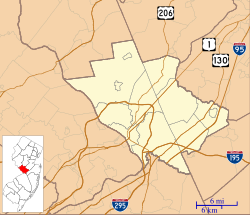Princeton University Art Museum
 |
|
| Established | 1882 |
|---|---|
| Type | Art Museum |
| Collection size | 92,000 |
| Visitors | 130,140 (2013-14) |
| Director | James Christen Steward |
| Public transit access | Princeton (NJT station) |
| Nearest parking | Nassau Street, Spring Street Parking Garage |
| Website | artmuseum |
|
McCormick Hall (1923)
|
|
 |
|
| Location | McCormick Hall, Princeton, New Jersey |
| Coordinates | 40°20′49.9″N 74°39′28.9″W / 40.347194°N 74.658028°WCoordinates: 40°20′49.9″N 74°39′28.9″W / 40.347194°N 74.658028°W |
| Built | 1923 |
| Architect | Ralph Adams Cram |
| Architectural style | Venetian Gothic |
| Part of | Princeton Historic District (#75001143) |
| Designated CP | 27 June 1975 |
The Princeton University Art Museum (PUAM) is the Princeton University's gallery of art, located in Princeton, New Jersey. Founded in 1882, it now houses over 92,000 works of art that range from antiquity to the contemporary period. The Princeton University Art Museum dedicates itself to supporting and enhancing the University’s goals of teaching, research, and service in fields of art and culture, as well as to serving regional communities and visitors from around the world. Its collections concentrate on the Mediterranean region, Western Europe, China, the United States, and Latin America.
The Museum has a large collection of Greek and Roman antiquities, including ceramics, marbles, bronzes, and Roman mosaics from Princeton University’s excavations in Antioch. Medieval Europe is represented by sculpture, metalwork, and stained glass. The collection of Western European paintings includes examples from the early Renaissance through the nineteenth century, and there is a growing collection of twentieth-century and contemporary art. Photographic holdings are a particular strength, numbering over 27,000 works from the invention of daguerreotype in 1839 to the present. The Museum is also noted for its Asian art gallery, which includes a wide collection of Chinese calligraphy, painting, ancient bronze works, jade carvings, as well as porcelain selections. In addition to its collections, the Museum mounts regular temporary exhibitions featuring works from its own holdings as well as loans made from public and private collections around the world.
Admission is free and the Museum is open Tuesday, Wednesday, Friday, and Saturday, 10:00 am to 5:00 pm, Thursday, 10:00 am to 10:00 pm, and Sunday 1:00 to 5:00 pm.
The first art work owned and displayed by the College of New Jersey (renamed Princeton University in 1896) was a full-length portrait of Jonathan Belcher, the Governor of the province of New Jersey who had promoted the establishment of the College. The portrait was a donation from Belcher himself, given shortly before the College moved in 1756 to the newly built Nassau Hall. It was joined by a portrait of King George II, who had issued the letters patent establishing the College. The two portraits hung in the central prayer hall, and were displayed alongside various antiquities and objects of natural history. The two paintings were destroyed during the 1777 Battle of Princeton and further objects were lost in the 1802 Nassau Hall fire, but the College continued its commitment to collecting and teaching from works of art and historical note.
...
Wikipedia

